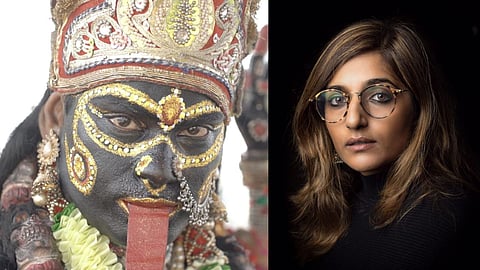

The Divine Hustle, with its runtime of under one hour, consistently expresses a filmmaker's anger and dissatisfaction at how religion benefits some while depriving others. When documentary filmmaker Sonali Devnani said that she studied journalism, it all made sense. The filmmaker takes us through some of the major fairs and festivals in some of the holiest sites of North India. The film gives a 360-degree view of diverse personalities, showcasing all kinds of emotions: From deriving positivity and hope out of faith, to anxiously waiting in pursuit of daily bread and butter after dressing up as gods. Sonali asks the pertinent question: Why do none of the 'magnanimous' souls that offer alms pause for a second and think why the children of their children's age are being forced to fend for themselves? Worst of all, people are disturbed by these 'pestering' kids and are in blissful ignorance of the causes. "I have been following and meeting all those characters in my movie for a year before I even began shooting. And in my meetings with them, I could connect with them and decided that I don't want The Divine Hustle to be an opinion piece but a story that unfolds from the children's eyes," says Sonali on how the idea of how to plan the film shaped up.
Sonali feels that temples are not spaces for spiritual rejuvenation, but can also serve as a tool to alleviate social and economic inequalities. "If not all temples, I feel at least the ones I visited, such as Pushkar, Kashi Vishwanath, and Mathura temples, can feed a minimum of 1000 people on a daily basis," opines Sonali, adding that her angst comes from a place of wanting religion and wanting it to be inclusive. "It is shocking to know how much the temples earn in festivals and how little they give back to the commoners. Shouldn't religion benefit even the last person in the line?"
The rhetoric of 'saving the religion' has found takers across the nation. The film, in a tiny space, has questioned the travesty of this rhetoric and shifts focus to what really saving the religion means. Sonali filmed people who went on record to claim that these children bring 'disrepute' to the religion. "Such statements took me aback. Those children, who should ideally be going to school, are in a hand-to-mouth condition. If at all the religion's pride is at stake, it should be because of their hapless situation and not what they were led to do due to it," she remarks, as she again complains that people aren't bothering about what they should actually bother. "Those who lose their patience with these children asking Rs 10 are not nearly as bothered about the price list of the priests, who preferentially do different poojas according to the price people are ready to pay. When this cannot be questioned, then it should be the same for the children."
Sonali also points out the hypocrisy of people who believe that these kids clad like the gods and goddesses are out to burn a hole in their pockets and are misusing the attire so that people would revere them, are the same people who dress up their grandchildren as deities for Instagram reels.
In its compact runtime, the film poignantly showcases the stories of two different fathers with contrasting outlooks on this profession. Gopal Saini's father, to mask his disability, has deified him and makes an earning out of this, whereas Abishek, who wants this to end with him, works determinedly to give a better life to the progeny. "Though I had to throw light on the children's difficult life, I didn't want to be too pessimistic either. And I liked how Abishek approached this and wanted to stop this with him," she adds, as she herself expresses shock and dismay at being unaware of the real story of Gopal Saini. "Gopal's father was evasive right from the beginning. Little did I know that he was actually enriching himself by making a pawn out of his son, and not for his computer education, as we see in the first few minutes of the documentary."
Sonali felt it was her responsibility to help the children, and making a movie about their plight was not enough. "I kept in touch with all the kids after filming. I have brought Gopal an electric bike, and I would do whatever possible to enroll Khushi in a school, as she seeks charity at Kashi to shore up money for her mother's surgery, and only then plans to pursue studies. It would be hypocritical of me not to take any initiative after making a movie on social apathy," she signs off.